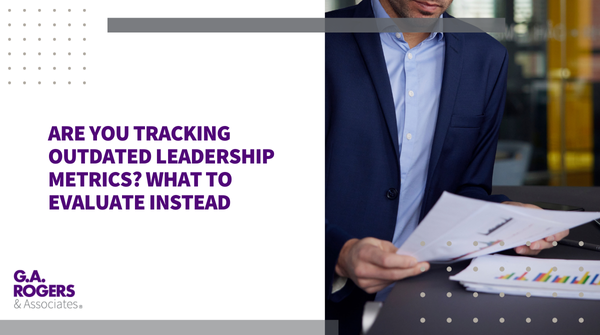Are You Tracking Outdated Leadership Metrics? What to Evaluate Instead

In today’s rapidly changing business environment, companies must reexamine how they evaluate leadership effectiveness. Traditional metrics of leadership strength are now outdated and fail to really measure the kinds of skills needed by executives today, skills that revolve around adaptability, innovation, and people.
Leaders should no longer be evaluated solely on criteria like control in an organizational hierarchy, short-term financial targets, and command-and-control management styles.
Outdated Metrics
One outdated metric is the focus on tenure and authority gained by virtue of a person’s position. While experience is valuable, the length of time spent in a leadership role does not necessarily correlate with the ability to drive change or inspire teams.
Similarly, an excessive emphasis on immediate financial outcomes—such as quarterly earnings or strict target attainment—often overlooks the importance of sustainable growth and long-term strategic planning.
Also, evaluating leaders based on micromanagement or their capacity to enforce rigid procedures disregards other critical aspects such as emotional intelligence and team empowerment, elements essential for a resilient and engaged workforce.
Modern leadership metrics, on the other hand, should adopt a more holistic approach that captures both quantitative and qualitative elements.
Modern Metrics – Engagement
Employee engagement has emerged as a key indicator of leadership effectiveness. High engagement levels, as measured through regular surveys and 360-degree feedback, reflect a culture of trust, collaboration, and transparent communication. In this metric, leaders are evaluated on their ability to create an environment where team members feel valued and motivated.
Modern Metrics – Emotional Intelligence
Emotional intelligence is another crucial modern metric. Leaders who demonstrate empathy, skillful conflict resolution, and the ability to inspire their teams, contribute significantly to a positive workplace culture.
Modern Metrics – Innovation, Adaptability
Moreover, innovation and adaptability are now essential benchmarks. Forward-thinking leaders are assessed on their capacity to drive new ideas, improve processes, and respond effectively to industry disruptions—metrics that highlight their proactive and agile mindset.
Modern Metrics – Diversity
Diversity and inclusion metrics have also gained prominence. Evaluating a leader’s success in promoting an inclusive culture that embraces diverse perspectives not only predicts long-term organizational resilience, but also enhances creativity and decision-making.
Modern leadership evaluation is about long-term value creation, sustainable growth, and the well-being of teams. Shifting away from outdated, rigid measures toward more progressive indicators is essential for building a company ready for the future, one based on collaboration, continuous improvement, and strategic innovation.
If your company is looking for qualified, reliable professionals, G.A. Rogers & Associates can help you find and hire them.
We thoroughly screen all of our candidates to ensure they have the skills and experience you need and that they will be a good fit for your company. Contact your nearest location today.



